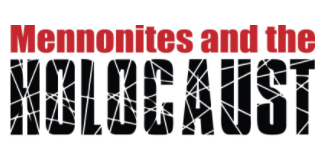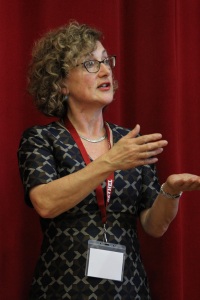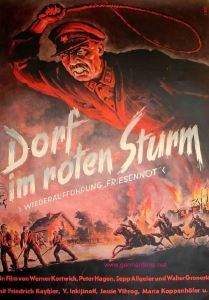Could Mennonites once again be drawn into supporting, collaborating with and even perpetrating such evil?
This is the question that haunts me after attending a recent conference on Mennonites and the Holocaust at Bethel College, North Newton, Kansas.
 The conference, attended by over 200 people from Ukraine, Germany, Poland, the Netherlands, U.S. and Canada, was the 3rd in a series of conferences on the same topic. The first two occurred in Germany (2015) and Paraguay (2017). These three conferences have highlighted an emerging body of scholarship on Mennonite complicity in the Holocaust.
The conference, attended by over 200 people from Ukraine, Germany, Poland, the Netherlands, U.S. and Canada, was the 3rd in a series of conferences on the same topic. The first two occurred in Germany (2015) and Paraguay (2017). These three conferences have highlighted an emerging body of scholarship on Mennonite complicity in the Holocaust.
Over the course of the two days, we heard 20 different speakers present their research into a profoundly disturbing story. These are a few of the things we heard…
…German Mennonite churches (both conservative and liberal) bought into National Socialism’s racist and anti-Semitic ideology that valued blood purity and Aryanism. Many Mennonites considered Adolf Hitler as God’s instrument to restore the fatherland of Germany. Their theology gave them few tools to resist Nazi propaganda because they had abandoned earlier Anabaptist commitments to nonviolence and had also lost a sense of the centrality of the Kingdom of God as inaugurated by Jesus.
…Many Mennonites in the Ukraine knew about—and a few even participated in—massacres of Jews around their communities during the period of German occupation, 1941-43. In one three-day massacre near Zaporizhia (and the Mennonite community of Chortitza) over 3,000 Jews were murdered and thrown into a mass grave. A Mennonite named Heinrich Wiens became an SS commander and was responsible for killing thousands of Jews. Many of the Mennonites hired by the Germans to act as interpreters translated lists of Jews who were subsequently murdered. Mennonites benefited from the German occupation while their Jewish neighbours suffered unmeasurably.

…Some Mennonites in Poland accepted homes and businesses confiscated from Jews. Refugees accepted the clothing and effects of Jews who had been killed. One prominent local Mennonite, Erich Ratzlaff, assisted in rounding up Jews for a new ghetto. Later in Canada, he edited the Mennonitische Rundschau for many years.
…In the Netherlands, many Mennonites actively supported the occupying forces. One such individual, Jacob Luitjens, played a role in the Nazi propaganda service and also helped to track down Jews. In 1991 he was extradicted from Canada to the Netherlands to serve the prison sentence handed down in absentia decades earlier.
…During the German occupation, some Mennonites in the Netherlands participated in the resistance movement and some also hid Jews. One of the latter, Gerrtje Pel-Groot, took a Jewish baby into her home while the baby’s parents hid elsewhere. The little girl survived the war, but Geertje died in a German concentration camp after someone informed on her. She is one of 40 Dutch Mennonites who have been honoured by Israel as “righteous among the nations.” But, as the Dutch scholar put it, why only 40?
…Mennonite Central Committee actively worked after the war to identify Mennonite refugees in Europe as Dutch rather than as German, and to minimize Mennonite connections to the Nazis. It did so in order to better enable the refugees’ escape from Europe to destinations in South America or Canada. MCC worked closely with avowed Mennonite Nazi supporters and party members like Benjamin H. Unruh.

At the end of two days of hearing these stories and much more, my heart ached and I struggled to hold back the tears. Questions swirled around in my mind.
- Why the silence? Why are we only hearing these stories now? This question was actually put to me by the one person attending the conference who publicly identified herself as Jewish. “Why has it taken Mennonites so long to acknowledge this?” she asked.
- How does memory shape a people and a narrative? The conference highlighted that memory is constructed—shaped and re-shaped to “make sense” of people’s experience. Memory can, for example, reinforce identities of victimhood, while denying identities of victimizer. How can memory serve to honestly bear witness to truth in all its complexity?
- Does a community’s own experience of trauma absolve it of complicity in the harming of others? Soviet Mennonites were, when German occupying forces arrived in 1941, deeply traumatized. Under Stalin, they had lived through forced collectivization, starvation, repression, and the murder or disappearance of thousands. Does that reality lift the burden of responsibility? Or does it simply explain why Mennonites did not come to the aid of the Jewish community?
- How do Mennonites recognize, acknowledge and atone for this dark side of our collective story? How do we lay aside the sense of “Mennonite exceptionalism” that we are somehow better than others?
- And this one: Could it happen again? Could Mennonites once again be drawn into supporting power structures that commit such horrible atrocities? How does the church in our day nurture the robust theological and spiritual resources, and the foundational commitments to justice, peacebuilding and Christian discipleship so necessary to resist systemic evil?
I am thankful to the historians and theologians, the preachers, poets and artists—as well as the organizers of this conference—for guiding our community in this painful but necessary journey.
More information on the conference is available here.
By Esther Epp-Tiessen, Public Engagement Coordinator for MCC’s Ottawa Office.

I can’t imagine that it would be easy to sit through a conference like this. So, is the question rhetorical? Probably. But an honest and thoughtful attempt to answer the question in the title of your article could be an important beginning to a necessary conversation.
As a child, I somehow absorbed a notion that Mennonites, as a people, were altogether righteous and heavenward bound. Anyone from another denomination or religion who entered the pearly gates, if it were even possible, should just thank their lucky stars. It was we Mennonites, after all, who, through trial and tribulation, had firmly grasped the gospel and all its truths. My parents, who would NEVER have deliberately passed such notions on to me, somehow did. Today, I imagine that most children grow up with an ‘understanding’ that their parents are wise and all-knowing, and that their expression of religion (or atheism) is the one true way.
As an adult, I am learning that my country is trying to hide some very dark and shameful pages from its history; that Caucasians like myself have a legacy of racism that continues to this day; that rich people (like myself) contribute far more than their fare share to the destruction of our planet; that Christian leaders are not excluded from the list of those who abuse others (physically, sexually, verbally, or emotionally); that MCC tried to pull the wool over the eyes of authority; that folks who share my Mennonite roots are not ALL peace-loving, peace-making followers of Christ.
I am learning that I am stained, not only by the shame of my own sins, but by the shame I bear by being Canadian, and male, and white, and rich, and Christian, and Mennonite . . . There is so MUCH to learn.
So, the answer to the question is . . . of course, yes, it could. And I’d love to be proven wrong!
Eric, thanks so much for your thoughtful comment. Perhaps a better question is “Is it happening?” or “How is it happening?”
Whoa. Good point. I hadn’t gone that far. But yes, those are good/important questions.
Thank you Esther, for this thoughtful, but disturbing article. The concerns you raise are very timely. In fact, I think some of your fears are already a sad reality. I have found my self asking the question many times, “How can Mennonites sing the national anthem? ….. “And the rocket’s red glare, and bombs bursting in air, Gave proof through the night, that our flag was still there”. What would happen if all the Mennonites would do what a few sports figures did last fall……refuse to stand up for the national anthem. But, we need to ask similar questions of Canadian Mennonites as well.
Blessings of your day and on your work.
Hilda Franz
Thank-you, Hilda, for reading and commenting. Warm regards.
I’ve been following the reports from the Bethel Holocaust Conference on the Anabaptist Historians website. Reading through this summary I was disappointed that you offer no personal reflections on the questions you raise. As an MCC staffer and MCC Canada historian you have assisted in telling an MCC story that turns out to be a deeply flawed and dishonest. This makes it all the more important that you address the thoughtful questions you ask and along with your colleagues begin shaping a revised narrative.
I have lifelong close friendships with Jewish people in the Diaspora and in Israel, I find the revelations about MCC’s collaboration with the Nazis appalling. But it does provide insight as to why MCC has been so lop-sided in its programming and advocacy on behalf of Palestinians.
I understand that MCC is having a 100th anniversary conference in 2020. This will be a good opportunity for for MCC to demonstrate full transparency and accountability for its historic and present day antisemitism.
Hello Kathy, Thank-you for your comment. MCC is working on a response. Best wishes.
About your Dutch scholar’s question–“Why only 40?”–we should consider the caveat posted on the Yad Vashev website: “It needs to be noted that the numbers of Righteous recognized do not reflect the full extent of help given by non-Jews to Jews during the Holocaust; they are rather based on the material and documentation that was made available to Yad Vashem. Most Righteous were recognized following requests made by the rescued Jews. Sometimes survivors could not overcome the difficulty of grappling with the painful past and didn’t come forward; others weren’t aware of the program or couldn’t apply, especially people who lived behind the Iron Curtain during the years of Communist regime in Eastern Europe; other survivors died before they could make the request. An additional factor is that most cases that are recognized represent successful attempts; the Jews survived and came forward to tell Yad Vashem about them.” — https://www.yadvashem.org/righteous/statistics.html
Of course we need to lose our rosy delusions about our people’s past. We are, on the whole, not any “better” than any other religious/ethnic community. But let’s not replace them with darker delusions by generalizing what some of our forebears did wrong to a large percentage of the European Mennonite population. In those dark days one could hardly take a breath without making some kind of moral compromise. Given that true saints never make up more than a small subset of any religious community, “only” 40 righteous Dutch Mennonites might be quite a remarkable number.
Thank-you, Vic, for your comment. This is helpful. I am struck by your comment, “In those dark days one could hardly take a breath without making some kind of moral compromise.”
Not clear if Benjamin Unruh was MCC or was he an avowed Nazis supporter/ member?
Hello Vic. I have been trying to ascertain how close the relationship was between Unruh and MCC. The presentation at the conference implied that he was under MCC’s employ, I’m trying to verify that. According to Ben Goossen’s book, Chosen Nation, Unruh was definitely a Nazi supporter and worked closely with the Reich as key consultant on Mennonites.
A bit more information. Yes, Unruh was employed by MCC from 1936 to 1942, and again for a time after the war. He also received some salary for a time from the Nazi regime.